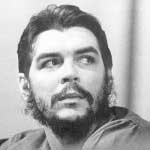
=By= Gaither Stewart
“Any nation’s victory against imperialism is our victory, as any defeat is also our defeat.”
The short biography: Ernesto Guevara was born in Rosario in western Argentina on June 14, 1928 of well-to-do, leftwing parents, the oldest of five children. He died in the Bolivian village of La Higuera on October 9, 1967 at the age of 39. His family moved to Buenos Aires when he was 17. He learned chess from his father of Irish heritage, read from the family of library of 3000 books and was home-schooled by his radical mother. He read Pablo Neruda, John (I want to do the world some good) Keats, Walt Whitman, Jack London, Federico Lorca, Faulkner, Gide, Camus, Sartre, Freud, Bertrand Russell, Marx, Engels, Lenin and many Latin American writers. He studied medicine and motorcycled through much of Latin America. He studied Marxism also while in the youth brigades in Guatemala during the Jacobo Arbenz leftwing government before it was crushed by a CIA-organized coup d’état. In 1955 he joined Fidel Castro in Mexico where the Cubans began calling him el Che because of his constant use of the common Argentinean interjection, Che, that means something like Hey! Or, Eh? Argentineans use the interjection so often that other Latin Americans sometimes use the word for a man from Argentina. In effect, “Che” Guevara came to imply also something like “our comrade from Argentina.”. Despite their contrasting personalities he and Fidel formed a “revolutionary friendship to change the world”, which expressed their common desire. He sailed with the Castro brothers and Cienfuegos on the Granma to Cuba where they overthrew the corrupt Batista regime—the four who made the Cuban Revolution. Twelve years later, as a commander of the guerrilla movement in Bolivia, he was wounded, captured and executed by a Bolivian soldier on orders from the CIA.
